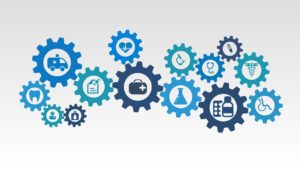 “Change is the only constant thing in our lives”
“Change is the only constant thing in our lives”
All of the professional associations and hospital associations are clearly alarmed at the thought of “The American Health Care Act” approval and implementation. Whether you are participating in an ACO, a small practice, a hospital system and/or an Ambulatory Care Center change is upon us regardless of whether the Act is enacted. Why is that? The economy as a whole appears to be in danger from the National rising amount of debt. Whatever the ideology the reader may have, The ACA has changed things forever. The minute everyone agreed that “pre-existing conditions” should no longer be a barrier to receiving Health Care under any insurance plan, the spreading of “risk” within the “pool” of patients has been put under a microscope by all of the stakeholders. Whatever new plan evolves for coverage and reimbursement, it will be based on data that accurately reflects the patient demographic, services provided, and the cost.
While the existing new “Act” has been pulled back, there is new thinking and an attempt to bring more people together to look at the facts about how more people can be covered without a deleterious effect on the entire economy. As providers of Health Care in all settings, we have to be prepared for whatever might be coming; what will come is not yet known, but it will be made up of compromises with which we may not find comfortable. Therefore, it is of paramount importance for survival that every setting for the provision of Health Care to begin thinking about what is the “Constant” in the Changing environment.
CMS has brought various experiments that will improve the quality of care by focusing on outcomes rather than volumes. A laudable experiment which theoretically keeps the provision of care “Revenue Neutral” and provides bonuses to all levels of providers. However, in doing that experiment there are mixed results and these have been documented in many articles. Clearly, the bonus situation is part good intentions and part fantasy.
There is a new CMS director, whose experience working with some States, has shown that Medicaid, which reimburses very little and is not acceptable to most providers, could be managed differently. Therefore, there may be new models for both quality and reimbursement for those who provide the care and for which we have to be ready. How does one get ready if there are not any proscribed models? Do we undo the ACO’s and create some other type of cost sharing? What best positions all providers for the coming unknown changes?
There is one constant that will become the basis for any new models; DATA: Clinical, Reimbursement and Cost data. There is a reminder about this in the new Budget for HHS: because a primary goal will be for activities that “Strengthen the integrity and sustainability of Medicare and Medicaid by investing in activities to prevent fraud, waste, abuse and to promote high quality and efficient health care”
This is stated clearly in the new budget and though it is currently proposed we can see some of the thinking that will drive the direction once the new Health Care Bill is in congress. Not many in the legislature will disagree with “Waste, fraud and abuse”. In light of recent convictions and prosecutions of physicians and other providers, including hospital systems for fraud and abuse, we are reminded by someone who once said, “it’s the peoples’ money” and it will not be wasted. So this will remain as a center piece of any legislation/budget that is before Congress. The Constant are the Data upon which decisions will be made.
Since Data will drive everything, it might be wise to think about using it for strategic decisions. Many facilities make their decisions based on Gross Revenue, but with the coming changes, our focus needs to shift to include what we are really getting paid for: the services performed. Focusing on Net Revenue as our key metric, we can deliver services that are effective and efficient (Patient Centric Clinical Management).
But you already know that. However, you may not be sure of how you will be affected. If you are in practice or run an institution you need to be concerned about the “real cost of care”, the true integration of clinical management, and having a complete understanding of how much you are costing the government and the big insurers. And finally you need to view the data at a granular level to support your plan for strengthening areas of vulnerability.
We already know that the new administration believes there is fraud and waste in government and the most vulnerable are the Medicare/Medicaid Programs. The other day, the Palm Beach Post’s leading article was about an Ophthalmologist who had been convicted of treating elderly patients for Macular issues unnecessarily and is going to jail and paying big fines; all was discovered in the DATA.
We have all of the information but we need to take the time to study it. But you say that you are too busy and that having a computer takes away from time with the patient and that to do any monitoring you will need more staff. At the same time reimbursement doesn’t pay the bills. Let’s think this through. No matter what the clinical discipline or the Institution, there are data and all of us must begin to use them in evaluating what we do. Data will determine where we are and where we are going. Only well analyzed data will give us the answer. So, there are several levels of concern: Clinical data sets (the Medical Record), aggregate billing data to all payors and finally, the “Deconstruction” of patient encounters in order to determine whether what we report is accurate.
We are advising our clients as we have for the previous 30 years of our work to create an internal plan. Make sure that you have the ability to find out if anything is wrong in the granular world because it will be the basis for your future positioning.
We are recommending a full on self-audit for all sectors done by impartial, highly skilled teams of physician, nurses, Coder’s, biller’s and documentation specialists. Some of the reviews should be prospective to see how the data flows, who touches it, what system transfers it, and how they are monitored.
The “deconstruction” must take place retrospectively and prospectively to insure understanding of processes and reliability. The one Constant on which Practices will be judged, or hospital systems evaluated will be on the basis of their data. So we advise working on basics and not worry (at least for the moment) what new paradigm will evolve. Know where you are so that you can go where you need to go.
Over the past thirty years our experience has been that with what we have described finds both vulnerability and opportunity. Recently our staff of Financial/data analysts, ICD 10 Trainers(certified) teamed with physician, nurse, and claims personnel to help major institutions and large practices to be properly positioned for whatever is coming.
We would be delighted to share our experience and begin a dialogue with you on so that you are properly positioned to move forward.
Cathy Idema
866-908-4224 ext. 101

